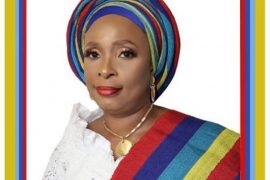The livelihood of women in every society is highly important given the sensitivity of women-related issues. Developing nations of the world, have deemed it fit not only to take these issues seriously but also to scale up the chances of gender equality which has become pivotal in the advocacy for developmental sustainability of world economies.
In this interview, Ethiopia’s Minister of Women & Children Affairs H.E. Demitu Hambissa, speaks on the activities of the ministry and the approaches put in place towards creating an enabling environment for women. Excerpt:
You have dedicated your life to public service, making your country a better place for everyone. Kindly tell us about your career journey and some of your successes and accomplishments.
I have been contributing to the public services of Ethiopia since 1982. I have served from district to the federal level in different positions. Just to mention some, I have served as a teacher at the district level and the head of the education office and women and children’s affairs office until 2004. My career journey took me to the regional level in 2005 and I served at the Oromia Region Women and Children’s Affairs Bureau as an expert on women’s economic empowerment, at the Office of the President of the Oromia Regional State as an executive advisor for social and women affairs, and as House Speaker of the Oromia Regional State Council until 2013. In November 2013, I transferred to the federal level and have served as a Minister at the Ministry of Science and Technology, the Ministry of Public Enterprises, and the Ministry of Women and Children’s Affairs of the Federal Democratic Republic of Ethiopia.
In these capacities, I have accomplished a lot in improving the social, economic and political life of women and girls and in empowering and protecting women, girls and vulnerable children in Ethiopia. I have been successful in mobilizing the community to be part of the issues and to invest its indigenous knowledge and resources for the solution. Just to share with you the two recent activities, I was successful in mobilizing the women development groups (WDG), the local women’s structures to save more than 3.4 million USD in one year, and in encouraging the group that saved more to be awarded on the International Women’s Day from the hands of His Excellency the Prime Minister. This mobilization was aimed to upgrade the saving culture of women. Currently, we are working on organizing with these women development groups to organize themselves through cooperatives to facilitate their financial access and, in turn, to achieve their economic empowerment. The other accomplishment was mobilizing the community and its resources to integrate children living and working on streets with their families using the regional structure of the ministry. Through this mobilization, in 2009 Ethiopian calendar, between July 2016 and June 2017 alone, 10,161 children have been reintegrated with their families and 11,856,708.70 USD has also been collected from the community to support the reintegration program. The establishment of district women councils and inter-district council forums for women and the development of district-net information system is among my other accomplishments.
Your ministry partners with the office of the first lady in areas of health and women empowerment. Please tell us about your country’s fight against cancer and your ministry’s role in creating awareness of cancer preventions and screening.
In the areas of fighting against cancer as a partner to Her Excellency the First Lady’s Office of Ethiopia, my ministry has contributed in the mobilization and awareness creation activities within the community through Women Development Groups, Health Extension Workers, and Agriculture Extension workers. In collaboration with Her Excellency the First Lady’s Office, the Ministry of Women and Children Affairs has also organized training and awareness creation programs for religious leaders, community-based associations, women’s associations, women development groups and sector bureau heads and staff. This training and awareness creation effort has raised the awareness of the community on cancer and the advantage of pre-screening to fight against cancer.
In addition to that, the ministry uses television, radio and print materials to reach the community to create awareness on cancer and pre-screening services. We also effectively utilize our national and international events to reach the community in general and the women, in particular, to discuss the issue of cancer and on the advantage of pre-screening services. For instance, as a result of these massive mobilization and awareness creation activities which lasted from June 2016 to May 2017, we reached 10,869,763 women and 1,270,493 women attended a pre-screening service in different health centres.
Findings reveal that 80 percent of the Ethiopian people reside in rural areas and women provide the majority of the agriculture labour in these communities. However, women have limited access to resources and their agricultural contributions often go largely unrecognized. What are some of your efforts to address this trend to support women in agriculture?
Ethiopian women constitute 49.8% of the population and contribute their share to over 65% in agricultural production, storage, and processing. Acknowledging the contribution of women in agriculture the government of Ethiopia has given due emphasis for assuring their access to resources and has developed the 1997 Federal Rural Land Administration Law which provides equal rights for women to land. The country’s five years Growth and Transformation Plan (2016-2020) has also considered agriculture as the main driver of the rapid and inclusive economic growth and development as well as the main source of growth for the modern productive sectors. Using these existing legal and policy frameworks as an entry point, my ministry has been working to empower rural women to have access to agricultural and financial resources and since 2010, over 11 million women have received their rural land ownership certificate, 2 million of whom are women household heads. Between July 2016 and June 2017, 878,268 rural women had access to women and environment-friendly technologies to save their time and minimise their physical labour.
In addition, the ministry has implemented a joint program of rural women economic empowerment with UNWOMEN to facilitate access to financial and environmentally friendly technologies for women living in rural areas.
There are lower economic opportunities for women in Ethiopia, such as limited access to credit and lower demand for their products due to marketing inexperience. Kindly tell us your ministry’s efforts in expanding economic opportunities for women in your country.
To expand economic opportunities for women and to ensure their economic empowerment, my ministry is working on enabling women to get life skill and technical training which will equip them to participate in different income-generating activities. In addition, providing market places and facilitating market linkages are the activities we are engaged in to expand women’s economic opportunities. As a country, there is a strategy for a micro and small enterprise which gives priority in providing access to financial resources for women through saving and credit schemes. In this regard, my ministry is working on mobilizing women to raise their awareness on the importance of saving and credit opportunities for women economic empowerment. As a result, between July 2016 and June 2017, the women development groups have saved around 2 Million USD and 1,459,799 women had access to credit were able to expand their economic activities in micro and small-scale business and in urban agriculture. As a result of these awareness creation activities, Ethiopian women’s access to job, credit, life skill and technical training and market linkage opportunities has improved significantly.
At the national level, all sectors are mandated to mainstream women’s issue in their plans and programs to contribute their share to the empowerment of women in the economic, social and political sphere. As a mandated ministry, the Ministry of Women and Children Affairs works closely with all the sectors to ensure the mainstreaming of the issues of women in all the sectors as well as to ensure the overall empowerment of women, including their economic opportunities. In addition, the ministry has implemented joint programs with partners to ensure gender equality and women’s empowerment in Ethiopia. These joint programs have created economic opportunities for women through technical training, materials, and financial resource provision to engage in different income-generating activities. These joint programs are implemented with UNFPA, UNICEF, UNWOMEN, UNDP, and ILO.
Some influential reports indicate that primary school enrollment rate of girls in Ethiopia has increased in recent years. But a majority of the girls are unable to transition to secondary and tertiary schools due to distance, personal security, and economic challenges. How are you reacting to this?
Girls’ primary school enrollment in Ethiopia has reached 96.2%. Their enrollment in secondary and tertiary education has reached 23.7% and 34.14%, respectively. As these data indicate, there is still a gap in the secondary and tertiary level enrollment. Distance, socio-cultural barriers for girl’s education like labour and time-intensive domestic chores, harmful traditional practices, and trafficking of girls are the major challenges contributing to the low enrollment rate.
To address these challenges, the Ministry of Women and Children Affairs, the Ministry of Education and their regional respective bureaus, and higher educational institutions jointly developed regulation and training modules focusing on anti-sexual harassment in schools and also skill training for girls. Similarly, gender sensitive pedagogy is implemented in teachers training institutions across the country. For distance-related challenges, we have developed guidelines on the provision of hostel service for female students. There are also guidelines developed on the provision of tutorial and academic support programs targeted to reduce dropout rates.
In addition, through a UN joint flagship program, the ministry is providing financial assistance to girls from economically challenged families to attend their schools.
To increase female’s enrollment in tertiary level education and to develop their leadership role, the Government of Ethiopia has developed a scholarship scheme for female public servants to pursue their master’s degree at the Ethiopian Civil Service University, a University established to build the capacity of public servants. In addition, currently, we are working jointly with UNFPA and Ethiopian Civil Service University to facilitate a scholarship for female leaders to enable them perusing their master’s education side by side with their family and leadership responsibility in weekend basis.
Massive awareness creation activities for changing the attitude of the community towards girls’ education, and developing different affirmative action initiatives are also some of the measures taken to solve the problem in girls’ enrolment rate at all levels of education.
Early marriage, female genital mutilation, and gender-based violence are still prevalent in Ethiopia, as with other developing nations, with adverse effects on young women and girls. What are some of your ministries efforts in recent times to enhance the fight against some of these harmful traditional practices?
To enhance the fight against harmful traditional practices (HTPs) the Government of Ethiopia has given due emphasis and developed a National Strategy and Action Plan on Harmful Traditional Practices against Women and Children. This strategy institutionalizes national, regional and grassroots mechanisms with the objectives of preventing HTPs, protecting women and children, and providing services to victims of HTPs.
The Ministry of Women and Children Affairs also leads a national HTPs platform which is composed of various sector ministries, national women, and community associations, and religious organizations to oversee the implementation of this national strategy and action plan. As an approach to implement the strategy, the ministry utilizes advocacy and monitoring work through grassroots organizations namely: women development groups and HTPs committee. We have also engaged religious leaders to teach about the harmful effects of HTPs thorough acknowledgement and blessing of the teaching of other health workers and the police on the issue related to HTPs.
To combat child marriage (CM) and female genital mutilation or cutting (FGM/C), the Government of Ethiopia entered a commitment to end the practice by 2025 at the London Girl’s Summit in 2015. To implement the activities to materialize the commitment, the Ministry of Women and Children Affairs has established a National Alliance to End Child Marriage and FGM/C consisting of all concerned stakeholders from government, UN, and other non-government organizations.
As a prevention mechanism, the ministry implements different awareness-raising activities to disseminate messages regarding HTPs and their adverse consequences through regular programs using electronic and print media, national and international events, and community gatherings. To protect the victims of HTPs, we have established one-stop centres to provide a comprehensive legal, medical, psychological and economic support for survivors of HTPs to rehabilitate and reintegrate them into their community. In this regard, different UN agencies have a joint program with my ministry to work on combating HTPs. Specifically, in the one-stop rehabilitation centres establishment and strengthening the program, UNFPA Ethiopian country office work closely with us. I want to use this opportunity to acknowledge the country offices of UNFPA, UNICEF, UNWOMEN, UNDP, ILO, UNAIDS and other UN agencies and our development partners for their contribution in this and other activities of the ministry.
You were recently nominated by your country’s First Lady Her Excellency, Madam Roman Tesfaye, for CELD’s Enablers of Vision Awards, which will be conferred on you during the International Conference on Gender & Sustainability in New York, in recognition of your support in the fight against cancer in Ethiopia. How do you feel about this?
I am happy to receive this nomination from Her Excellency First Lady Mrs. Roman Tesfye. I feel that my contributions to better the life of Ethiopian Women and Children including their health has brought change. The ministry has put its fingerprints on the achievements made by the First Lady in fighting against cancer. I would like to use this opportunity to thank Her Excellency First Lady’s Office for the nomination and recognition, the CELD for the invitation to attend the conference and all the stakeholders, particularly the Ethiopian Women and their development groups, for contributing to our efforts to improve the lives of women and children in general and our fight against cancer in particular.




